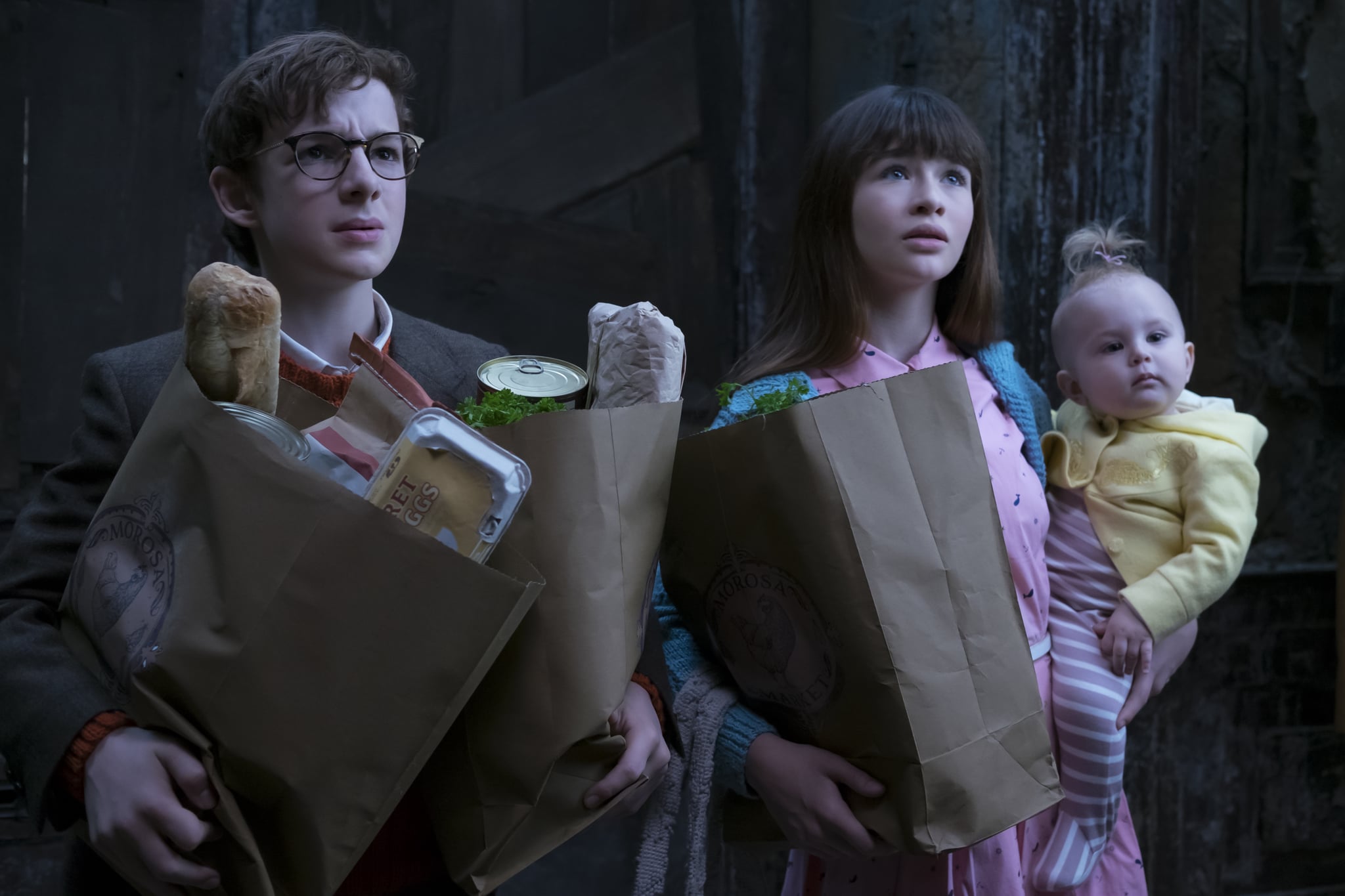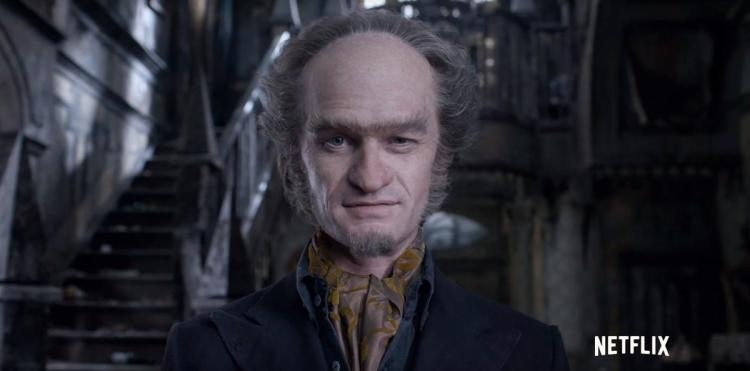Daniel Handler's (also known by his more famous pen name, Lemony Snicket)
A Series of Unfortunate Events has had a rocky road in terms of on-screen adaptations. The 2004 big-screen translation amounts to a Jim Carrey vehicle that tried to align Handler's 13-part series more with
Harry Potter. The films boasts some great visuals and a highly energetic Carrey performance but contains little of the cutting wit and satire so prescient in the novels and instead tries to aim for a more broad-family appeal. The film did middling at the box-office but just enough for rumours of a sequel to rumble on for a good few years (including the idea of a stop-motion animated follow up). However, it seemed that the novels were unlikely to see an on-screen version that would truly capture the dry, dark and sly satirical world of Handler's novels and its strange and often warped characters. Therefore, I for one celebrate the arrival of Netflix's take on these novels, with the first season adapting the first four books (
The Bad Beginning,
The Reptile Room,
The Wide Window and The Miserable Mill). Handler is the executive producer and writer, meaning that, finally, this series may well get the justice they deserve. I came to this first season with very high hopes - the books share the same nostalgia and affection as the
Harry Potter series, coming in second only after the boy wizard as my favourite books to read growing up.
 |
| The books are very nostalgic for me. Growing up, I always appreciated Handler's different style of writing compared to other children's books. After a disappointing film adaptation, the new TV series has high expectations from myself |
 |
| The omnipresent Lemony Snicket regaling the tragic story to us |
 |
| The charming new interpretations of Violet, Klaus and Sunny |
The series follows the brilliant Baudelaire children; Klaus, the bookworm, Violet, the inventor and Sunny, a baby who loves to bite things. They find themselves in the most unfortunate of situations, learning that their parents have perished in a mysterious fire. Whisked away by the useless Mr. Poe (who has been tasked with dealing with the Baudelaire will) to live with their mysterious 'uncle', the children soon learn that their long lost relative is actually the nefarious Count Olaf, who will stop at nothing to gain the vast fortune left behind by the Baudelaire parents. Thus Violet, Klaus and Sunny embark on their voyage of to try to find a new home, whilst dealing with the increasingly insane plans of Count Olaf to obtain their fortune. Also not to mention the often unfair and dark adult world, whilst trying to unravel the mystery of who their parents really were.
The show's format, for the most part, suits adapting the books very well. Each book is given two episodes, meaning all the elements that made Handler's books shine are given time to develop. In the long run, this is probably the smartest way of adapting the books. It does mean however that the adaptations of the first two books do suffer, being the slimmest and simplest of the novels. There's not quite enough to justify four 45 minute episodes.
The Bad Beginning sees the Baudelaires, as mentioned, thrust into the care of the mean 'actor' Count Olaf, who forces the children to work menial jobs, whilst the villain schemes to obtain their fortune.
The Reptile Room has the children move to their Uncle Monty's, an expert in reptiles and making people feel welcome into his home. Things seem peachy until Monty's 'new' assistant turn up, clearly Count Olaf in disguise.
The Wide Window sees the children moved to their Aunt Josephine's rickety house overlooking the depressing Lake Lachrymose. Josephine adores grammar but is terrified of the outside world. Worst still, her established inhibitions melt away when a sea captain turns up and begins to woo her - turns out he is non other than, you guessed it, Count Olaf. Finally,
The Miserable Mill breaks formula a little bit by having the Baudelaires follow up a photograph of their parents at Lucky Smells Lumber Mill and hope to find a new clue about the wider mystery they have been uncovering. Count Olaf hooks up with an old flame to hatch his most diabolic scheme yet. The first season covers a lot of ground in only eight episodes. As the books become more complex, the show becomes that more engaging.
The Wide Window and
The Miserable Mill are clearly the strongest parts of the season as they begin to tap a bit more into that sense of underlying sadness and disappointment that the books capture so well. The plots themselves are meaty and offer greater visual opportunities, such as the Baudelaires traversing the dark Lake Lachrymose and the depressing air of Lucky Smells Mill. While there is a slight over-reliance on green screen locations (which makes me miss the grandiose sets of the film version) the first season manages to fit in a fairly impressive amount of locales, keeping an appropriate amount of moody lighting and gothic art design to match the tone. I'm assuming the budget wasn't massive for this season but they are clearly stretching it as far as it can go.
 |
| Neil Patrick Harris is great fun as Count Olaf |
 |
| The big-hearted Uncle Monty - too good for the world of A Series of Unfortunate Events |
The best thing the series does is effectively establish the relationship and personalities of the Baudelaire siblings. While they can be a little wooden at times, Malina Weissman and Louis Haynes as Violet and Klaus respectively feel very natural in their roles and grow into them more as the material steadily gets more and more complex. They share some great scenes together, in particular during
The Miserable Mill section, as Violet pleads with Klaus to break our of his hypnosis invoked by Count Olaf's schemes. The big stand out in the early episodes is, of course, Neil Patrick Harris as Count Olaf and he's as every bit as sinister, goofy and over-the-top as you want him to be. While he lacks the sheer physicality of Carrey, Harris makes up for it with excellent line delivery and a real snarky and sinister tone. He's clearly relishing the role, especially after the children escape his clutches and he has to don disguises to trick their new guardian into handing them over to him. My favourite is Captain Sham in
The Wide Window - quite possibly his worst disguise and, by the laws of comedy, his funniest. Speaking of which, while some of the comedy in general is a bit awkward at first, the self-aware humour matures, especially as we reach the climax of the season. The main cast and comedy are bolstered by some great guest stars, including Joan Cusack as Justice Strauss, Aasif Mandvi as Uncle Monty, Alfre Woodard as Aunt Josephine, Catherine O'Hara as Georgina Orwell, Don Johnson as Sir and Rhys Darby as Charles. All contribute strange and varied performances that really help the show come to life. I also love the expansion of Count Olaf's henchmen, who are essentially sinister but slightly mis-led big children. Finally, K. Todd Freeman is a delight as the incompetent Mr. Poe - like Olaf's henchman he's essentially a child stuck in the body of an adult who doesn't really know he's doing. There's something kind of endearing here, even if he is one of the most frustrating characters in the whole series! Mr. Poe probably has some of the funniest lines, especially in situations where he glibly shrugs off accusations about Count Olaf being in disguise.
 |
| Mr. Poe - one of the funniest and most frustrating characters in the show |
Better yet, Handler seems to be retrospectively adapting the early novels to fit into the wider mystery story introduced in the later stories. If I have one criticism of the early novels (up until book seven maybe) it's that they can feel a little bit samey - the Baudelaires go to a new guardian, get comfy, then Count Olaf comes along to ruin their day and they must thwart his new plan to get their fortune before escaping to their next unfortunate event. And while the episodes do follow this basic formula still, they work really well at building up an underlying mystery, as the orphans begin to discover the true of nature of their parents and a wider hidden organisation and plot. The novels only really begin to introduce this at the half way point and drastically change the formula in doing so. The re-tooling of the early novels means that the stories are allowed to breath a bit more and feel as part of a wider narrative, as opposed to individual formulaic parts (if that makes sense). There's plenty of clues, symbols and red herrings that will keep audiences pondering until season two.
The first season of A Series of Unfortunate Events is a very solid introduction to Handler's world. While it does suffer in the very early episodes (simply because the first couple of novels don't really have enough content for four 45-minutes episodes), the second half settles into a very odd groove that's somehow funny, dry, and emotionally engaging. The best move the season makes is to have each story work as part of a wider picture that builds up to an even greater mystery. The adult performances are great and, even if they do feel a bit wooden at times, the child actors feel natural as Violet and Klaus. I think there's great potential here, especially based on the strength of the last four episodes, and I am dreading the arrival of season two, which promises to adapt books five to nine. Well, Lemony Snicket wants us to dread its arrival - more like eagerly anticipating. It's a good beginning as opposed to a bad one.




No comments:
Post a Comment